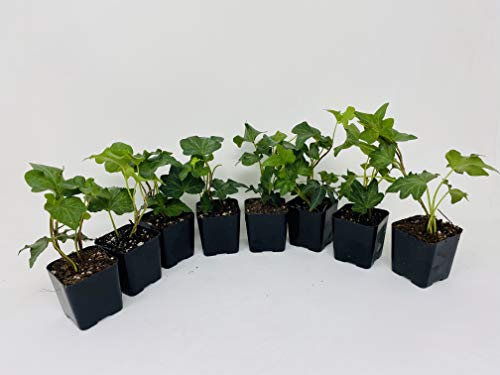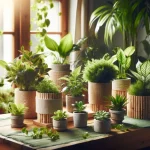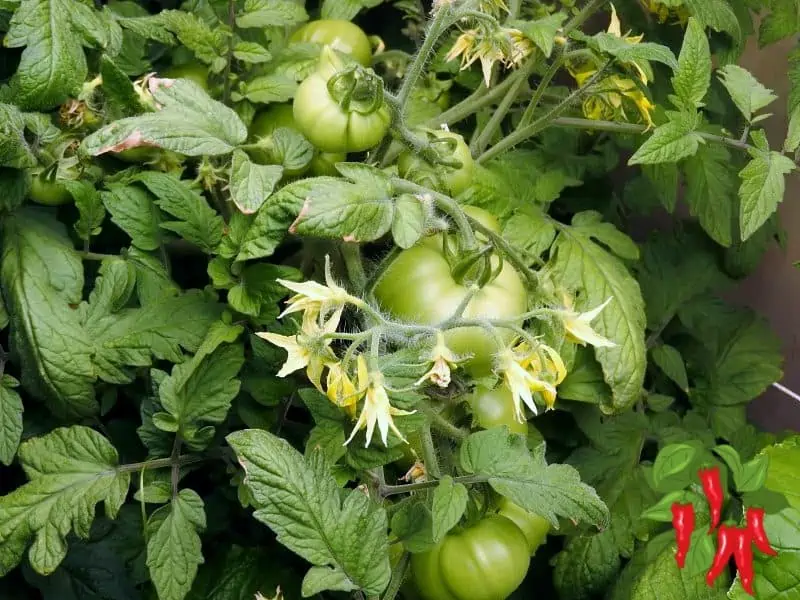This post may contain affiliate links. If you buy something from one of our links we may earn a commission. Thanks

Vining plants for vertical gardens are ideal for maximizing small spaces. They include varieties like Clematis, Trumpet Vine, and Passionflower, which provide stunning blooms and lush greenery.
Best Vining Plants for Vertical Gardens
Are you struggling to make the most of your limited garden space?
It can be frustrating to find plants that thrive vertically while adding beauty to your garden.
Vertical gardens are a fantastic way to maximize space, especially in small areas like apartments or urban settings.
When it comes to choosing the best vining plants for your vertical garden, you want to consider plants that not only look great but also thrive when grown vertically.
Discover the best vining plants for vertical gardens to transform your small space into a lush, green oasis!
1. Best Vining Plants for Trellis
If you’re looking to add some vertical charm to your garden, trellises are the way to go. They support climbing plants that bring a lush display of foliage and stunning flowers to your space. Here are some top picks for your trellis:
Clematis
Sweet Summer Love (Clematis) Live Shrub, Red-Purple Flowers, 1 Gallon
Clematis plants are renowned for their large, vibrant flowers, available in a variety of colors. They’re perfect for adding a burst of color and elegance to any garden.
- Variety: Clematis armandii ‘Snowdrift’
- Features: White, fragrant flowers and evergreen foliage
- Growth: Vigorous climber, ideal for covering trellises quickly
- Care: Prefers well-drained soil and full sun to partial shade
Trumpet Vine (Campsis radicans)
Trumpet Vine – Campsis radicans – 4″ Pot with Root 100% Survival Guaranteed
Trumpet vines are spectacular with their bright, trumpet-shaped flowers that attract hummingbirds. They can grow quite large, so a sturdy trellis is essential.
- Flowers: Vibrant trumpet-shaped, ranging from orange to red
- Growth: Can grow up to 30 feet or more
- Attraction: Attracts hummingbirds and other pollinators
- Care: Thrives in full sun and well-drained soil, but needs regular pruning to manage growth
Passionflower (Passiflora)
Passionflowers are exotic vines that produce intricate and unique flowers, making them a standout addition to any garden.
- Flowers: Unique, intricate, and colorful
- Growth: Fast-growing, quickly covers trellises
- Features: Adds an exotic touch to your garden
- Care: Prefers full sun to partial shade and well-drained soil, can be grown in pots or directly in the ground
These vining plants not only add visual appeal but also bring a bit of nature’s magic to your vertical spaces. Happy gardening!
2. Best Vining Vegetables
Growing vining vegetables is a great way to maximize your garden space while enjoying fresh produce. Here are some excellent options for your vertical garden:
Cucumbers
Cucumbers are a fantastic choice for vertical gardening. They climb easily and can produce a generous harvest.
- Variety: ‘Spacemaster’
- Features: Compact growth, ideal for small spaces
- Growth: Vigorous climber, requires a sturdy trellis
- Care: Needs full sun and consistent watering, prefers well-drained soil
Pole Beans
Pole beans are prolific climbers and can cover a trellis quickly, providing both beauty and bountiful harvests.
- Varieties: ‘Kentucky Wonder’ and ‘Blue Lake’
- Features: Dense foliage, prolific production
- Growth: Can grow up to 8 feet or more
- Care: Thrives in full sun, needs support for optimal growth
Peas
Snow Pea Seeds – Dwarf Sugar Grey – Non-GMO Seeds
Peas are lightweight climbers that are perfect for small trellises or netting. They’re easy to grow and produce sweet, tender pods.
- Types: Snow peas and sugar snap peas
- Features: Lightweight vines, tender pods
- Growth: Rapid climbers, ideal for vertical gardening
- Care: Prefer cool weather, full sun to partial shade, and well-drained soil
These vining vegetables not only enhance the visual appeal of your vertical garden but also provide fresh, homegrown produce. Enjoy the best of both worlds with these green, productive climbers!
3. Best Vining Plants for Indoor
Bringing vining plants indoors adds a fresh, natural vibe to your home. They can thrive in various conditions and add a touch of greenery to your living space. Here are some top choices:
Philodendron
Philodendron Black Cherry Pink Princess Starter Plant
Philodendrons are incredibly versatile and low-maintenance, making them perfect for indoor settings.
- Features: Thrives in low light, adaptable to various environments
- Growth: Can be trained to climb supports or trail down from hanging baskets
- Care: Prefers indirect light and regular watering, but can tolerate occasional neglect
Pothos
Pothos is a hardy plant known for its ability to thrive in different conditions, making it a favorite for indoor gardeners.
- Features: Hardy and resilient, grows well in various conditions
- Growth: Can be trained to climb trellises or hang from planters
- Care: Prefers bright, indirect light but can also tolerate low light, needs well-drained soil and moderate watering
English Ivy (Hedera helix)
English Ivy is a classic choice for indoor vining plants, known for its lush green foliage.
- Features: Lush, green display, ideal for creating a vertical green wall
- Growth: Climbs easily and can be trained on trellises or allowed to trail
- Care: Prefers bright, indirect light and regular watering, but avoid overwatering
These indoor vining plants not only beautify your home but also improve air quality, making your indoor environment healthier and more inviting.
4. Best Vining Plants for Pots
Growing vining plants in pots is a fantastic way to bring color and life to your patios and balconies. They can create stunning vertical displays and add a touch of nature to your outdoor spaces. Here are some top choices:
Sweet Pea (Lathyrus odoratus)
Sweet Peas are well-loved for their fragrant and delicate flowers. They do well in pots with a small trellis or support.
- Flowers: Fragrant and colorful, ranging from pastels to deep hues
- Growth: Perfect for pots with small trellises or supports
- Care: Needs full sun to partial shade and regular watering, prefers well-drained soil
Morning Glory (Ipomoea purpurea)
250 Ipomoea Purpurea Morning Glory Climbing Vine Flower Seeds
Morning Glories are fast-growing annuals that produce vibrant and showy flowers. They are ideal for pots with supports.
- Flowers: Bright, trumpet-shaped, and available in various colors
- Growth: Rapid climber, great for vertical displays in pots
- Care: Requires full sun and regular watering, thrives in well-drained soil
Bougainvillea
Bougainvillea is known for its vibrant and colorful bracts. It can thrive in pots, especially in warm climates.
- Flowers: Brightly colored bracts in shades of pink, purple, red, and orange
- Growth: Can be trained to climb supports or cascade from pots
- Care: Prefers full sun and well-drained soil, needs moderate watering
These vining plants can transform your pots into beautiful, vertical gardens, adding a burst of color and fragrance to your outdoor spaces. Happy planting!
5. Best Vining Plants for Low Light
Not all vining plants need full sun to thrive. For those shady spots in your garden, you need plants that can handle lower light levels. Here are some of the best options:
English Ivy
Baltic English Ivy 8 Plants – Hardy Groundcover – 2 1/4″ Pot
English Ivy is a classic low-light plant that can add a lush, green look to any shaded area.
- Features: Evergreen foliage that covers walls or trellises
- Growth: Thrives in low light, making it perfect for shaded areas
- Care: Prefers indirect light and regular watering, but avoid overwatering to prevent root rot
Star Jasmine (Trachelospermum jasminoides)
Star Jasmine is not only beautiful but also resilient, tolerating partial shade while producing fragrant white flowers.
- Flowers: Small, white, and highly fragrant
- Growth: Can grow well in partial shade
- Care: Prefers well-drained soil and moderate watering, thrives with some direct sunlight but tolerates shade
Climbing Hydrangea (Hydrangea petiolaris)
Vining Hydrangea Plant Live Climbing Vine Shade in Pot, Starter Plant
Climbing Hydrangeas are great for shaded areas, providing large, attractive flowers and a lush green backdrop.
- Flowers: Large, white, and showy
- Growth: Does well in shaded or partially shaded areas
- Care: Needs rich, moist soil and regular watering, especially during dry spells
These vining plants are perfect for adding greenery and beauty to the shadier parts of your garden. They thrive where other plants might struggle, bringing life and color to low-light areas.
6. Best Vining Plants for Fence
Transforming a plain fence into a lush, green wall can provide privacy and enhance your garden’s beauty. Here are some excellent vining plants for covering fences:
Honeysuckle (Lonicera periclymenum)
Peaches & Cream-Lonicera periclymenum Honeysuckle Vine-Rooted Starter Plant
Honeysuckle is a great choice for fences, offering beautiful, fragrant flowers and attracting pollinators without being invasive.
- Flowers: Fragrant and tubular, ranging from white to yellow
- Growth: Climbs quickly and easily covers fences
- Care: Prefers full sun to partial shade and well-drained soil, needs regular watering
Carolina Jessamine (Gelsemium sempervirens)
Carolina Jessamine is known for its bright yellow flowers and rapid growth, making it perfect for covering fences.
- Flowers: Bright yellow and fragrant
- Growth: Fast-growing, ideal for creating a natural privacy screen
- Care: Thrives in full sun and well-drained soil, needs moderate watering
Virginia Creeper (Parthenocissus quinquefolia)
Virginia Creeper (Parthenocissus quinquefolia) Live Plant in 4″ Pot
Virginia Creeper is famous for its stunning foliage, which turns a beautiful crimson in the fall, quickly covering large areas.
- Foliage: Green in summer, turning crimson in fall
- Growth: Rapid climber, can cover large fences quickly
- Care: Prefers partial to full sun and well-drained soil, drought-tolerant once established
By choosing the right vining plants for your specific needs, you can create a stunning and functional vertical garden that adds beauty and productivity to your space. Happy gardening!
Tips for Growing Vining Plants Vertically:
- Support: Ensure you have a sturdy support system, such as trellises, cages, or arbors, to help your plants climb.
- Pruning: Regularly prune and train your vines to encourage healthy growth and maximize space.
- Watering: Vining plants often require consistent watering, especially during dry spells.
- Feeding: Use a balanced fertilizer to promote vigorous growth and abundant flowering or fruiting.
With the right selection of vining plants, your vertical garden can become a lush, productive, and beautiful space. Happy gardening!
Best Vining Plants for Vertical Gardens FAQs
Whether you’re new to vertical gardening or looking to optimize your current setup, you might have some questions about the best plants and practices. Here are some common questions and answers to help you out.
Q: What plants grow best in vertical gardens?
A: The best plants for vertical gardens include vining vegetables like cucumbers, pole beans, and peas, as well as flowering vines such as clematis, trumpet vine, and passionflower. These plants are well-suited for climbing structures and can provide both beauty and productivity to your vertical space.
Q: What is the easiest climbing vine to grow?
A: Pothos and philodendrons are some of the easiest climbing vines to grow. They are hardy, low-maintenance, and thrive in a variety of conditions, making them perfect for both indoor and outdoor vertical gardens.
Q: What plants grow well in vertical shade gardens?
A: For shaded vertical gardens, plants like English Ivy, Star Jasmine, and Climbing Hydrangea are excellent choices. These plants tolerate lower light levels and can still provide lush, green coverage and beautiful blooms.
Q: What vegetables climb up a trellis?
A: Many vegetables are well-suited for growing on a trellis, including cucumbers, pole beans, peas, and even some varieties of squash and gourds. These climbing vegetables not only save space but also make harvesting easier.
Q: Is there a vine that blooms all summer?
A: Yes, some vines bloom throughout the summer, such as the trumpet vine and certain varieties of clematis. These plants provide continuous color and can enhance the visual appeal of your garden during the warmer months.
Q: What is the fastest vining plant?
A: The fastest vining plants include morning glories and sweet peas. These rapid climbers can quickly cover a trellis or fence, providing quick and beautiful coverage.
By understanding the needs and characteristics of different vining plants, you can create a thriving vertical garden that suits your space and gardening goals. Happy gardening!
Vining Plants for Vertical Gardens Conclusion
Creating a vertical garden with vining plants can transform any space, whether it’s a small balcony, a shady corner, or a plain fence.
With the right selection of plants, you can enjoy a lush, vibrant garden that not only looks beautiful but also serves practical purposes like providing fresh produce or adding privacy.
Benefits of Vertical Gardening
Vertical gardening offers numerous benefits, such as maximizing limited space, improving air circulation around plants, and making harvesting easier for vegetables.
It’s an excellent solution for urban gardeners or anyone looking to add greenery to their environment without needing a lot of ground space.
Choosing the Right Plants
Selecting the appropriate vining plants for your specific conditions is key to a successful vertical garden.
Consider factors like light availability, space, and the type of structure you’ll use for support.
Whether you’re growing vegetables, flowering vines, or indoor plants, there’s a perfect vine for every situation.
Key Takeaways
- Maximize Space: Vertical gardens help make the most of limited space by growing plants upwards.
- Versatility: There are vining plants suited for various conditions, including full sun, partial shade, and indoor environments.
- Beauty and Functionality: Vining plants add aesthetic appeal while providing practical benefits like fresh produce and natural privacy screens.
- Easy Maintenance: Many vining plants, like pothos and philodendrons, are low-maintenance and easy to grow.
- Seasonal Blooms: Some vines, such as trumpet vine and clematis, offer continuous blooms throughout the summer, enhancing the garden’s beauty.
By incorporating vining plants into your vertical garden, you can create a dynamic and thriving space that meets your gardening goals. Happy gardening and don’t forget to keep it green!
Read more: Indoor Vertical Gardening: Start Your Indoor Garden Now
Read about the maintenance of vertical gardens
Resource Section
For those looking to dive deeper into vertical gardening and vining plants, here are some valuable resources from educational institutions that offer detailed guides and insights:
- University of Florida IFAS Extension
- Vertical Gardening: This guide covers different types of vining plants, how to establish and grow them, and the benefits of vertical gardening. It includes practical advice on setting up supports and maintaining your vertical garden.
- Read more here
- Nebraska Extension in Lancaster County
- Vertical Gardening Makes the Most of a Small Garden Footprint: This article explains the benefits of vertical gardening, offers ideas for creating vertical structures, and provides tips on choosing plants suited for vertical growth.
- Read more here
- University of Minnesota Extension
- Trellises and Cages to Support Garden Vegetables: This resource details the different types of trellises and stakes you can use for vertical gardening, along with planting tips and support systems for various vining vegetables.
- Read more here
- Kansas State University
- Maximize Garden Space by Growing Vertically: This article discusses the benefits of vertical gardening, types of support structures, and the best vining crops for vertical growth, with practical tips on setup and maintenance.
- Read more here
- Oklahoma State University
- Grow More in Less Space with Vertical Gardening: This guide explores creative vertical gardening solutions, suitable plants, and tips for maximizing space and yield. It includes innovative ideas for supports and plant care.
- Read more here
By exploring these resources, you can gain a comprehensive understanding of vertical gardening and find the best practices to make your garden thrive. Happy gardening!
Visit my Amazon Influencer Page for videos and gardening products Grow Your Own Garden
























